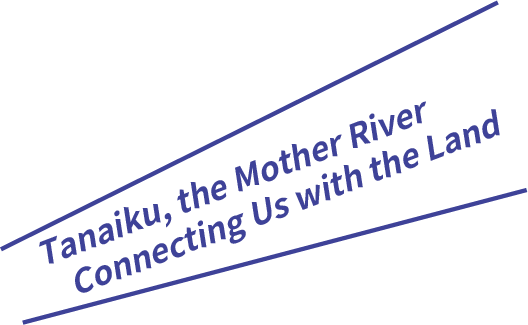
Tanaiku is the traditional fishing ground of the Saviki Community. The stream is the mother river that feeds and brings closer the relationship within the community. An Li-Hua says, “whether it's limiting access to the river to protect the fish, developing a tourism industry, or rebuilding after the disaster, everything we do is to make sure that our people can stay and live on our own lands.”

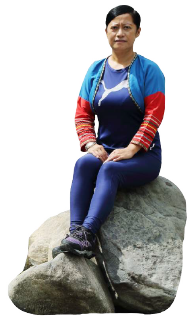
Rugged rocks stand erect amidst the valley, schools of Taiwan shoveljaw carp swim freely. The beautiful river named Tanaiku has always been abundant in aquatic animals, it is the traditional fishing ground of the Saviki Community, and clans in the community each have managing rights over different sections of the river, in turn building strict river ethics and order not to be violated.
“The landscape has vastly changed around here since the Typhoon Morakot,” An Li-Hua (Akuan? e Yasiyung?), chief of Saviki Village in Alishan Township says, starting at the Tanaiku in front of her, with a hint of lament. In fact, it took them great effort and a long journey of limiting access to the river to protect the fish and rebuilding after the disaster. Having suffered many years of human and natural destruction, once almost depleted of fishes, now Tanaiku again boasts of clear waters and abundant aquatic animals.
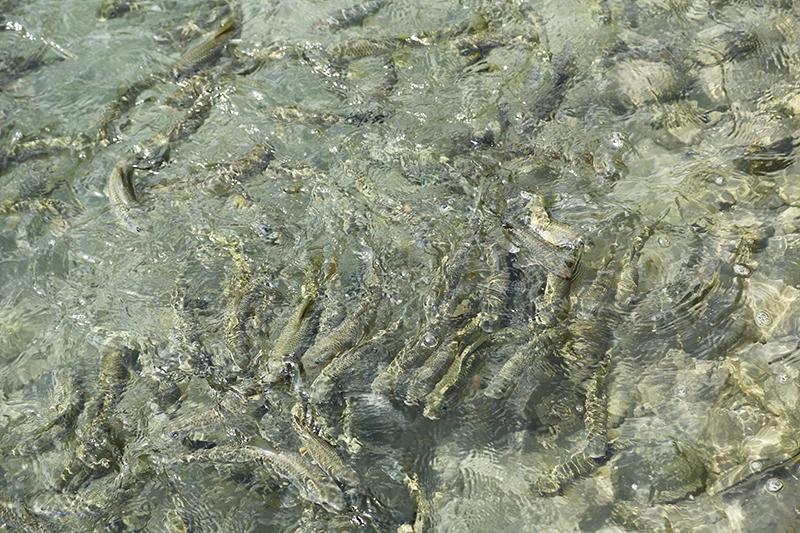
Tanaiku is the home of Taiwan shoveljaw carp. Although once on the verge of extinction, with tremendous restoration efforts from the Tsou community, schools of Taiwan shoveljaw carp again swim in abundance.
Catch Only As Much As
You can Consume
As An Li-Hua recalls from her childhood memory, her parents used to take her and her siblings to the river section which belongs to their clan, her father would go fishing while her mother assisted, and the kids would just be playing with water along the riverbank. “There were Lake candidus dace, Sharp-jaw barbel, and Taiwan shoveljaw carp in the river, the Taiwan shoveljaw carp in specific was considered most delicious by our people!” so says An Li-Hua.
Fishing in the mountain creek is a traditional lifestyle of the Tsou. In addition to using the fishnet, harpoon, and fish trap to catch food for daily consumption, the Tsou practices a unique group fishing activity - limiting access to the river and poisoning the fish. To ensure the quantity of fish caught during group fishing, clans with managing rights to the river section will collectively limit access to the river for 3 to 5 years and wait for the fry in the river to reach maturity. A day will be selected later, when all clan members would gather by the river and use tuba root to put the fish to sleep before catching them on a large scale. “We will mash the tuba root for its juice by the upper stream or beside the stones, once aquatic animals come into contact with the tuba root juice, they will become temporarily paralyzed and flip belly side up, that's when our people will fish them out.” An Li-Hua explains that the tuba root is not lethal and will only temporarily put the fish to sleep without contaminating the river ecology.
Limiting access to the river to poison fish is to ensure a maximum catch during collective fishing, “we will pick ones that are medium or large-sized, and release back into the river ones that are smaller in size.” An Li-Hua further adds that “unlike the modern-day concept, our ‘large’ catch does not come in tons. In the old days, there were no refrigerators to chill food, so we mainly catch the amount that the population in the community can consume.” Between what is required to survive and the natural environment, the Tsou abide scrupulously by the code of ethics of the river, taking a measured amount to maintain the sustainable balance.
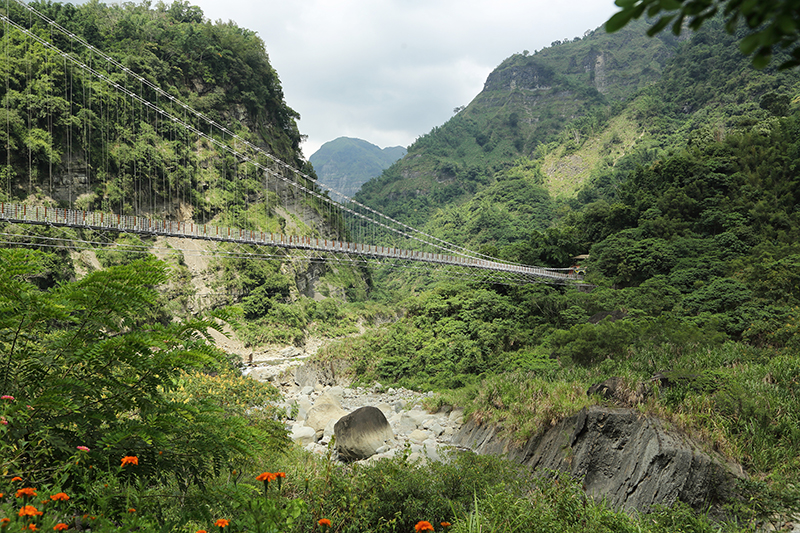
Upstream of Zengwen River, the Tanaiku is the traditional fishing ground of the Saviki Community and a sacred place of the Tsou.
Restore the Environment and Ecology
while Developing a Tourism Industry
But before long, aquatic animals in Tanaiku slowly depleted. In 1982, Alishan Road was officially open to the public, and the concept of selling and trading was introduced to the community. An Li-Hua explains that outsiders began coming to their community to bomb or electrify fishes illegally, or even using chemical agents to poison them, catching in large quantity aquatic animals from the Tanaiku, “some of our people began doing the same in seek of profit, which not only destroyed the ecology and environment, our original way of life and the code of ethics of the river also faced consequences.”
To restore their environment and traditions, the Tsou community convened a village assembly in October 1988 and made the resolution that beginning the following year, the community shall follow the tradition and initiate three to five years period of “limiting access to the river to protect the fish.” This time around, they are not limiting access to the river for a bigger catch but to protect the next to zero aquatic animals left in the Tanaiku and develop a community industry at the same time.
Sitting at a mere 500 meters above sea level, the Saviki Community inside the valley cannot grow crops with high economic benefits the way other Tsou communities sitting at mid to high altitude can, such as Dabang and Lalauya, community industry development is limited, thus making it harder for the younger population to make a living at home. The beautiful scenery of the Tanaiku has always been the most valuable resource of the community, if they could restore the river ecology, in the future, the community would be able to move into the tourism industry and strike a balance between the ecology, environment, and industry.
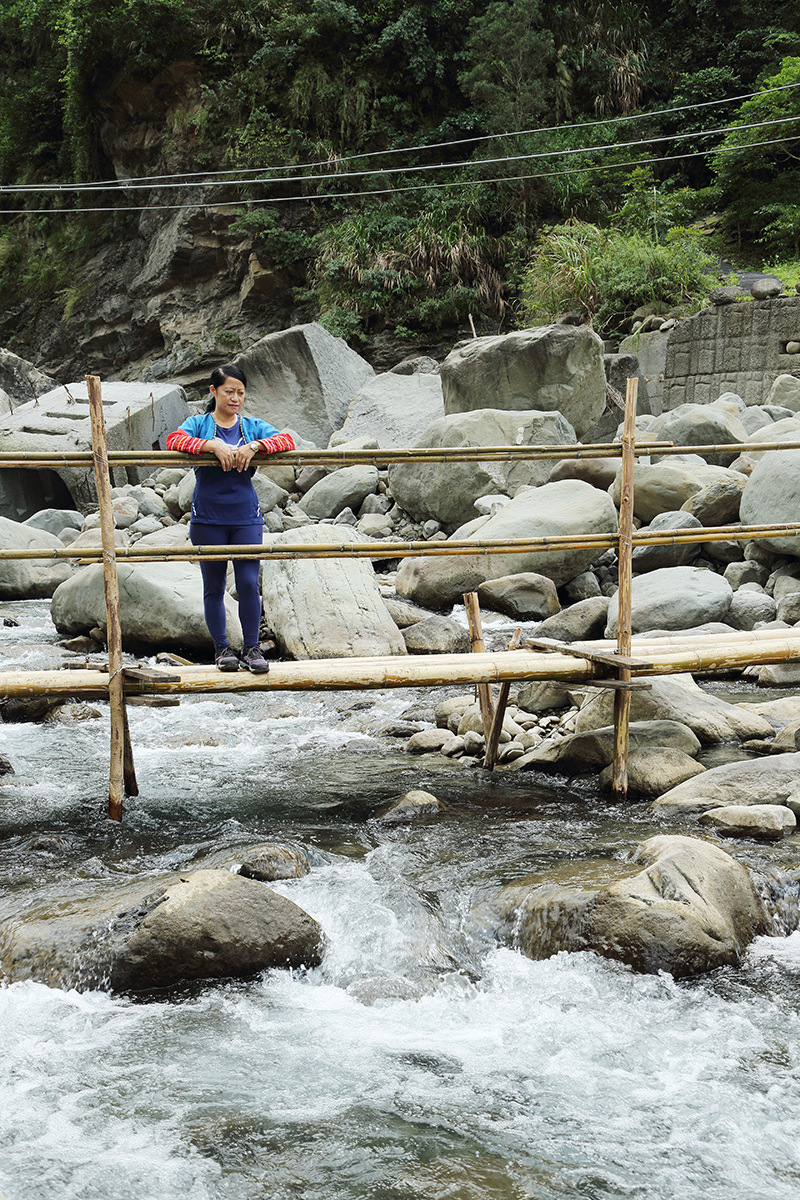
As the current chief of Saviki Village, An Li-Hua has taken part in the protection of Tanaiku from a young age.
Even Our Own People
are Punished If Caught
Limiting access to the river to protect the fish at Saviki Community is significant in terms of achieving both economic industry development and ecological conservation. Saviki Community is the first in Taiwan to initiate a convention of river self-government which is the fruit of the collective awareness of the residents. People in the community decided to ban all forms of fishing in the Tanaiku and applied to the public sector to draft relevant penalties. Anyone caught fishing illegally will be brought to the police station pending further punishment. To demonstrate their determination, everyone between the ages of 15 to 50 volunteered to form the Tanaiku Patrol, and they patrolled and protected the river for 5 years.
Still a student back then, whenever An Li-Hua returned to the community during school holidays, she would take part in the patrol with her siblings, “this was a resolution jointly made by the community, everybody naturally took part in the patrol.” Limiting access to the river to protect the fish allowed the community to transcend the generation gap. The younger generation became proactive in taking part in community affairs while the older generation is gradually passing on the responsibility to the younger generation.
“Tanaiku is not just our traditional territory, it is an important medium in shaping our solidarity.” An Li-Hua says that when the community first proposed to limit access to the river to protect the fish, the idea of ecological conservation had yet to become mainstream. Protecting the Tanaiku to benefit the development of the tourism industry felt like betting on the future, “especially when the managing rights of different river sections belong to various clans, for people to be willing to relinquish their rights and allow the community to manage collectively was the most important step in limiting access to the river to protect the fish.”
In 1995, life returned to the Tanaiku, and it was reopened to the public as “Tanaiku Nature Park”. The Park attracted tens of thousands of tourists, and local job opportunities were also created. The community further organized the Saviki Community Tourism Development Association and Saviki Community Co-op, Alishan Township, Chaiyi County, allowing the community to collectively manage and operate the nature park.
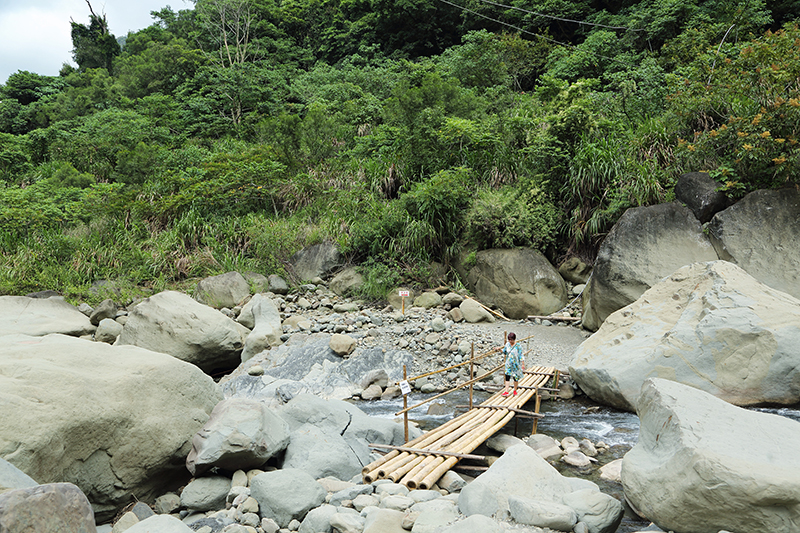
Tanaiku Nature Park is the first in Taiwan to be successfully rebuilt and restored wholly by the residents. With its rich ecology and beautiful environment, it is now a famous tourist spot.
Hit by Typhoon Morakot,
Tanaiku Again Devastated
However, Typhoon Morakot in 2009 devastated the land and property of the community, almost obliterating everything that was accumulated at the Tanaiku. “The flood washed away the roads and bridges, Saviki Community became a lone island, Taiwan shoveljaw carp disappeared from Tanaiku, and all the hardware and infrastructure were destroyed.” An Li-Hua recalled the depressing atmosphere in the community as they faced their devastated homes, some even suffered post-traumatic syndrome and would become anxious and frightened at the sound of the rain.
When rebuilding after the disaster, the government planned to relocate people living in dangerous areas to permanent houses down the mountain. An Li-Hua, then chairperson of Saviki Community Development Association, did not agree, “the rebuilding of the community and Tanaiku requires participation from everyone. If they are all gone, there would be no point in rebuilding.”
To keep people in Saviki, she fought to build permanent houses where it's safe in the community, and with the memory of the community working together to limit access to the river to protect the fish, she called upon the courage in everyone to face rebuilding after the disaster. “We were also facing an uncertain future then. This is our land, we can make it,” she said firmly.
Eventually, most of them chose to stay and work together to rebuild the community. After 14 months of renovation, Tanaiku was again opened to the public. Nowadays, the water is still running clean in the Tanaiku, schools of Taiwan shoveljaw carp still swimming freely. People in the community have become nature interpreters who share lively stories of the place with tourists, and the mother river continues to gurgle past them with vibrancy.




